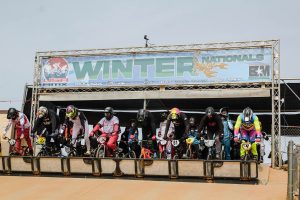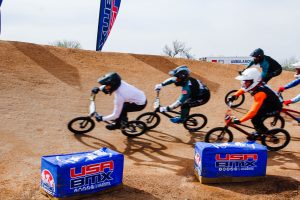- Slug: Sports-Black Mountain BMx, 1,500 words.
- 2 photos available (thumbnails, captions below)
By Hayden Cilley
Cronkite News
PHOENIX – Every lap, twist and turn, Black Mountain BMX had the embodiment of family on full display with USA BMX Winter Nationals last weekend. Former BMX riders and current Black Mountain BMX track operators Bubba Harris and Karl Clark went around the track connecting with all riders, vendors and sponsors of the event through handshakes, hugs and conversation.
For Harris, the Phoenix track evokes fond memories of his BMX journey that began at an early age. A year later, his dad Burlin became involved and the bond between the two continued to grow.
“I started racing when I was 7 but right around the age of 8, my dad fell in love with the sport as well and he began a business called BMX Super Camp and that’s still going on today,” Harris said Saturday. “We traveled the country going from BMX track to BMX track with basically a crew of professionals.”
Harris raced at Black Mountain BMX as a kid and met Debbie Kelley, who operated the Black Mountain BMX track, which began construction in 1981 and debuted in 1987. However, this wasn’t the first lap Kelley took in racing, as she was around the sport since 1975. Crediting her two sons for the love of the sport, Kelley also recalled seeing a BMX track that inspired her to build the track.
“I was just driving down 43rd Avenue and Union Hills and I saw this little dirt track and pulled over and here’s all these cars, these kids and dads,” Kelley said. “I walked up to the first dad and I said, ‘What is this? What are you guys doing?’ That started the whole beautiful odyssey.”
The familial bond resonated with Harris when he met Kelley. As his passion for BMX riding grew as a kid, his mother died. The community quickly rallied around him.
“Bubba lost his mother in a really hard time in a boy’s life,” Kelley said. “She was so instrumental and they were so close and this is the difference in this sport. The whole sport mourned with him and the whole sport watched over him to make sure that if he needed a hug or needed something, that somebody would be there.
“That’s the real, true core beauty of this sport. It is a family.”
Before taking the reins as the track operator in 2023, Harris was on top of the BMX world. In 2004, Harris became the youngest racer to hold an American Bicycle Association professional title, becoming ABA No. 1 Pro at 18.
Unfortunately for Harris, his prime was cut short in Beijing as he prepared for the 2008 Olympic Games. During the time trials, Harris gruesomely dislocated his ankle to the degree that it was hanging by mere skin and ligaments. Another disaster struck the following summer, the year of the Olympic Games, as Harris broke his opposite foot while practicing at a state-of-the-art track at Chula Vista. Coincidentally, the track was a replica of the BMX course in Beijing.
It was the final blow that brought Harris’s career to an abrupt end. Although he became involved as a coach years later, his sudden retirement kept nagging at him. While helping others compete at all levels, the bitterness of his career-ending injuries persisted. The what-ifs came up left and right.
Harris’ perspective on the sport and life sharply pivoted in 2013, when he started serving at his local church, Christ’s Church of the Valley. The moment he stepped foot in the church, he realized the gifts he has for the sport and how he can use that to show what is important.
“At that time, I was frustrated with BMX,” Harris said. “My retirement didn’t go the right way, and I was just mad at the sport. I was still coaching for a living and all that and then I found Jesus man and he changed my perspective on everything. He showed me what was important and then I just realized what a blessing it was, what I was doing, like coaching and hanging out with these kids.”
As a mother of two and even referring to Harris as one of her boys, Kelly knows the importance of what BMX can build in a young person, not only the ones coaching them.
“I so believe in what it does for kids and families,” Kelley said. “It’s healthy, it gets them outside … I believe in dirt, dirt is therapeutic for kids. Kids need to go to bed clean, get up and get dirty during the day, be outside, do something physical.”
Throughout his career, Harris came into contact with Clark. When they met through a mutual friend, Clark and Harris immediately clicked.
“We were both in the same sport and that’s when we were actually like, ‘Hey, we need to be friends,’ and we’re still best friends to this day and our families are all part of this program,” Clark said. “Our wives are involved, our children are involved. It’s a family affair out here and it always has been, even with the previous owners and whoever owns it after us. BMX as a sport in general is 100% family orientated.”
Harris recalled that under the previous ownership of Kelley, he wanted to help the track by suggesting to build a brand new team of members and volunteers. Soon enough, Kelley talked to Harris and his wife about purchasing the track and becoming the operator, along with Clark.
One of the main principles that Clark and Harris implemented was to focus on coaching. Through volunteering at his church and specifically working with students in junior high and high school, Harris uses that experience to connect with future riders and build a family-like bond.
“Carl and I both grew up coaching and loving the sport and now we get to do that at our own spot,” Harris said. “We do want to make this facility focused a lot on coaching but we’re also racing, like this weekend is huge. We just took over in November and then we tore everything down, flattened it and then rebuilt what we wanted. This is a brand new rebuild and everything’s brand new.”
Harris wanted the rebuild for a while. Taking advantage of social media and using applications like Instagram and Facebook, the duo is building a name for themselves and the company. Harris laid the foundation of what he aspires to happen.
“There’s so many kids that love bicycles here, but there’s still somebody that doesn’t have any idea that we exist,” Harris said. “It was really kind of everything to stay invisible and we are doing the opposite of that. We want everybody to know that we’re here.”
“To really grow this, you have to be up on all that (the digital age), and these kids are phenomenal,” Kelley said. “I mean, they’ll sit down and put a beautiful flier together and their wives help with it. They’ll sit down and pop this beautiful color, fancy pictures and everything.
“I’m back in the old days where we used to hand-carry bundles of flyers to the schools. Those were my flyers. Mine weren’t these beautiful things that are up everywhere on the internet.”
The influx of kids competing in events at Black Mountain BMX and other tracks around the country continues to climb. From Kelley’s perspective, she believes that kids can start participating in BMX without anything other than a bike.
“Most people can’t afford to rent ice to have an Olympic skater or they don’t live close enough to an Olympic pool with a coach that could take them to the Olympics,” Kelley said. “Now our sport is in the Olympics and every little kid has a bike and so every little kid can dream that dream and they can set their own goals and get excited. It’s just a beautiful thing.”
The family concept of BMX has been present in Black Mountain BMX since the inception of the track. Clark has seen the sport change since he was a kid and described how it will continue to evolve.
“There’s a big team aspect and everything has gotten bigger; the pit spaces, the volumes of the team,” Clark said. “Back when I was a kid, it was like, ‘Hey, there’s 10 of us friends, let’s be John’s BMX team.’
“Now, there’s all these factories coming out here and supporting all these kids, which gives more kids opportunities to be part of that team because it’s an individual sport. You either win or lose all on your own yet at the same time, there’s a full team aspect to it because we have a big support group behind you.”
As the ownership has shifted from Kelley to Harris and Clark, she looks back on how far the track has come since 1981, and there’s one constant.
“Well, when we first started, no one had any idea what BMX was,” Kelley said. “We’d have to clarify the fact that it’s not motorcycles, it’s pedal bicycles. As far as the changes throughout the year, the tracks have changed, track designs have changed, the equipment has really changed but the families haven’t.
“You still have that family unit that gives them something, to be able to speak the same language with their kids, to be able to enjoy something at the same time with their kids.”
For more stories from Cronkite News, visit cronkitenews.azpbs.org.

